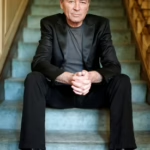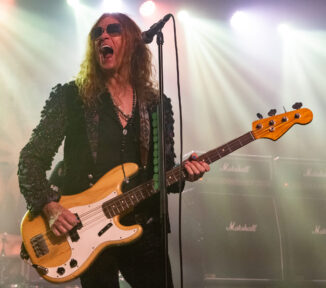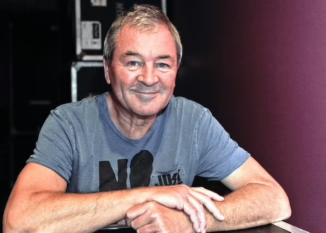
Your new album, One Eye To Morocco is just about to be released later this month. Are you pleased with how it’s turned out?
I’m thrilled to bits, yeah. It was a joy actually. With Deep Purple there’s a lot of pressure on as we go into the studio with absolutely nothing. With this I had 38 songs already written which I have done over the last 4 or 5 years. The hardest bit was selecting them for the album.
The title, One Eye To Morocco, is that a nod to the musical influences that are featured on the album or is there a specific meaning to the title?
It’s an interesting story. Before the title or lyrics were complete, that was the track that I had selected by which the other songs on the album would be judged by. If they went musically with that song they were on the record otherwise they went back into the library. When I was putting the finishing touches to it I recalled a story in Poland. I was in Cracow in the Jewish quarter with my friend who was explaining about Oscar Schindler and as he was talking, a beautiful woman walked behind him and I followed her across the road with my eyes and she disappeared. I came back and asked him what he’d been saying and he said that I’d had one eye to Morocco which basically means that someone has a wandering eye. In Polish the full saying is that you have one eye to Morocco and the other to the Caucasus. It literally means you’re cross eyed and looking in two different directions. More philosophically it means that you’re daydreaming, like when you’re sitting in the office thinking about what you’re going to be doing at the weekend. I think it’s the perfect musical metaphor as if Deep Purple is my Caucasus then my solo work is my naughty weekend away. That’s what this record is all about, it’s the freedom to do stuff you wouldn’t normally do. There’s no Rock rhythm section or improvised guitar solos. It’s making records as we used to do before the Heavy Rock bands came along.
It’s your first solo album of all new material in over 10 years. Why has it taken so long to write the follow up to Dreamcatcher?
I had no plans to do this but sadly Roger Glover’s Mum became very ill and died last year so we cancelled a couple of tours so he could be with her. I took myself off to Buffalo in New York to rehearse with some session musicians who were friends of mine out there. We spent a week rehearsing and went up to Canada to record all of the tracks and guide vocals in 3 days. Basically there was an opportunity to make the album due to the unfortunate break in our schedule otherwise it would have taken another 10 years to come out.
Recording the bulk of the album in 3 days is a pretty quick process when you consider it can take some bands 5 years to record an album these days?
Well Deep Purple’s spontaneity is usually around 5 weeks but that’s a different process as we go in and start from scratch with nothing. With this, we went in with the songs already written. It was just a question of handing it over to the Producer.
Your previous album Gillan’s Inn was a celebration of your career and featured guest performers including Uli Roth, Joe Satriani and Jeff Healey playing on a range of songs from your Deep Purple and solo days. This time you’ve decided to forgo guest artists and instead have gone for more of a “band” approach. Were you not tempted to call in a couple of favours or did you want the music to stand on its own merits?
That was a different kind of thing altogether. This album isn’t really about virtuoso performances. We weren’t waiting for the big guitar solo and we weren’t waiting for the big drum turn. We wanted the musicians supporting the songs.
You’re again working with long time collaborator Steve Morris who co-wrote much of the material on the album.
Yes I did, but we had to keep him at home, we didn’t want to allow him into the studio..ha!! When we did the demos Steve loves the whole Rock band ethos and if he’d worked on the songs from the demo form they’d have been a lot more like a Rock band and we didn’t want that. So he was involved up to the writing process and that was it.
You’d worked on almost 40 songs for the album, how did you decide which 12 to use?
We measured each song against the title track. This was the pivot for the album and we weighed each track against that. We selected 50% of the songs in the first selection and then cut it down by another 50% and made the final selection from there.
What’ll happen to the other songs, will they be getting released at some point?
Well I’ve written another 10 since this album so I’ve got nearly 40 again so I don’t know what we’ll do but the good stuff tends to rise to the top so maybe that ‘s the way to go.
You’ve also worked closely with Michael Lee Jackson. Where did you come across him?
Michael is a wonderful guy and a good friend of mine. He’s a lawyer, not a musician. He’s a very keen music lover and whenever any shows were in town he’d buy a ticket and go along. Deep Purple’s manager has a legal background too so Michael just sent him a letter and asked for a backstage pass. He turned up backstage and we got on really well. I meet a lot of friends that way as we don’t get out much.
Musically One Eye To Morocco is a very diverse collection of songs. Has this been an outlet for your musical ideas that weren’t suitable for Purple?
It’s funny you should ask that as I’m going up to Scotland tomorrow to do a sort of Desert Island Discs sort of thing for a friend’s radio show. He asked me to get together a list of my 20 favourite songs. When I was looking at my list I was surprised at how few Hard Rock bands there are on there. I’ve got Ray Charles, Dusty Springfield, Ronnie Dio “Love Is All”, Led Zeppelin, Creedence Clearwater Revival, Dixie Dregs, Chris Bennet, Lonnie Donnegan, Small Faces, Jimi Hendrix, Rolling Stones, Edgar Winter, The Beatles and Dean Martin and this is where I came from. These are all the kind of things that I grew up with that I brought to Deep Purple. Combine that with Ian Paice and his Big Band stuff, Jon Lord’s Classical stuff and Roger Glover’s Folk music and Ritchie Blackmore’s studio technique and Rock ‘n’ Roll background and that’s what the chemistry of Purple became. If you took any of those elements away you can see the roots, to coin a phrase.
It’s quite a rhythmical album with a cool groove running through a couple of the tracks, particularly on Deal With It . Do you think it will surprise some of your older fans?
I don’t know. I never really think about the fans to be quite honest. If you do that it’ll drive you nuts. If you make a record to please people as opposed to making the most natural music you can then it just won’t work. We’ve always tried to record what’s come naturally and sometimes it coincides with the public taste and what the fans like and sometimes it doesn’t. Sometimes you look back years later and think the best album I ever made only sold 5,000 copies or the best gig I ever did was in front of only 25 people. You’ve got to think about what’s natural and what comes from your heart. There’s certain things that I’ve noticed over the years that have changed in music. One of them was when the keyboards replaced the rhythm guitar. Most bands used to have two guitarists, a lead and a rhythm guitarist. Then the Blues came along and with it came the Hammond Organ or piano so the rhythm guitar became something of a lost art. I was listening to my new record a few days ago and I thought the rhythm guitar held things together so much and the bass lines you could hear so much more as they weren’t swamped in this heavy treatment. It’s hard to explain about music but I was in Milan recently doing a photo shoot for the label and there were lots of girls in the studio and they put the record on quietly in the corner on a little boombox. They weren’t listening to it and were just nattering away and I saw something out of the corner of my eye and I thought “Awwhhh!!” , all their bums were moving in time to the music and I thought “mission accomplished!”. I liked that a lot.
It’s not an album that pins you to the wall, it’s not like Deep Purple, it’s less intrusive and a little more intimate and the rhythms are a little more seductive too.
“Don’t Stop” seems to be a natural choice for a single. Are you planning on releasing this as a single at some point or are singles something that doesn’t bother you much these days?
Oh, I don’t know really. I haven’t got a damned clue to be honest !! I don’t know how to promote things as I haven’t done it for such a long time. I guess I’ll be guided by the label and they are 100% behind it and it’s been a long time since that happened. My favourite tracks tend not to be that commercial but I don’t really know what makes a radio play track.
Talking of rhythmical nature of the album, you’ve dabbled with the bongos in the past. Is that you playing on the album or have you got someone else in for that?
I’ve actually given up that about 10 or 15 years ago when I developed Raynaud’s disease which is a bit like Vibration White Finger, the same thing that guys who use pneumatic drills get. I used to batter the hell out of those things and consequently destroyed all of the capillaries in my fingers and they turned deathly horrible white. It seemed to have gone away when I stopped playing the congas or bongos as you call them, just in time. That was actually my producer playing those.
Overall there’s quite a relaxing, summery feel to the album. It’s the perfect antidote to the coldest UK winter in almost 20 years!!
Yeah, I think you’re right. My favourite track on the album is “Girl Goes To Show” with its Caribbean, Reggae slant to it.
Deep Purple is pretty much a full time job for you and you’re either in the studio or out on the road for much of the year. Did you not feel like putting your feet up for a while and chilling out or were there too many ideas flying around for you to settle down for long?
No, no no!!! I get plenty of time off. We get about 3 months of the year off. As someone pointed out we played in 48 countries last year and when you get home you can’t just turn off. I do a lot of writing and music accounts for around 25% of my writing. The internet and what I put into my website takes another 15% and the rest of it is working on different projects and I just love doing it and as it comes out it gets written down. Over Christmas mind you I did absolutely nothing for two months and it drove my editor nuts. I just put my feet up and drank some whiskey, watched some football on TV and spent some time with my family. There’s a time for everything.
Will you be playing any shows to support the release?
It hadn’t really occurred to me really because of the kind of music it is and the way it needs to be presented. I’ll wait and see if there’s a demand for it. If there is then yes and I’d like to do it in a very special way. I have plans in the back of my mind but we’ll see how it goes.
Back in the late ’70’s and early ’80’s Gillan featured the likes of Bernie Torme, John McCoy, Colin Towns and Mick Underwood. Have you been in touch with any of them since Gillan split in the early ’80’s?
No, those were great times but it came to a shuddering halt. Basically I ran out of money and I just couldn’t support it any longer.
Do you get offers to tour with those guys from promoters?
No, absolutely not. I haven’t had a single call from anyone about that.
As far as Deep Purple goes, where are you with the follow up to Raptures of the Deep?
You know we got together a while back to discuss the new album and we sat in the bar for 2 hours and I went to bed thinking we didn’t discuss music once. We were just talking about football and family and stuff like that. Undoubtedly it will pop up. That’s the great thing about Purple is that we just get up and do it.
Later this year you’ll be playing some UK shows. Have you got any more dates scheduled yet?
It’s absolutely non stop before those UK dates, it’s a pretty full schedule and we’ll be covering a lot of places. We’re very much looking forward to getting back out on the road and playing together again.
Ian Gillan’s new album One Eye To Morocco is out now on earMUSIC. For more information visit gillan.com





Be the first to comment